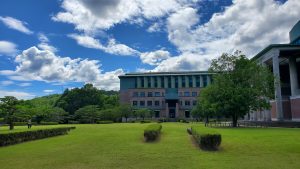Kochi University of Technology
KUT was founded in 1997 originally as a private university and became a unique new public university in April, 2015 after unification of two public university corporations, KUT and the University of Kochi. KUT currently serves 2308 undergraduate students, 272 Master students and 57 Doctoral students (as of May 1, 2020) with 307 faculty members and 93 administrative staff. KUT is aiming to become a world class university through the pursuit of unique educational excellence, research excellence, and social contribution. Unlike most Japanese universities, KUT is on the quarter system and the 2nd quarter, which runs from early June to early August, is also called its international quarter for easy international exchange and study abroad. KUT has four schools including School of Systems Engineering, School of Environmental Science and Engineering, School of Information, and School of Economics & Management. KUT’ has its “unique-in-Japan educational system”, where all courses are electives with the goal to develop students’ potential to the maximum. KUT was highly recognized for its research capabilities with a particularly high score for “Industry income (knowledge transfer)” and its Japan University ranking is 34th (out of 116 universities), according to U.K. Times Higher Education (THE). Among domestic public universities, KUT is ranked 3rd in the area of research and 2nd in the area of international outlook, and was recognized highly in “research achievements which contribute to the future of the world” and “cultivation of global human resource”(https://www.kochitech.ac.jp/english/news/2020/005241.html ).
after unification of two public university corporations, KUT and the University of Kochi. KUT currently serves 2308 undergraduate students, 272 Master students and 57 Doctoral students (as of May 1, 2020) with 307 faculty members and 93 administrative staff. KUT is aiming to become a world class university through the pursuit of unique educational excellence, research excellence, and social contribution. Unlike most Japanese universities, KUT is on the quarter system and the 2nd quarter, which runs from early June to early August, is also called its international quarter for easy international exchange and study abroad. KUT has four schools including School of Systems Engineering, School of Environmental Science and Engineering, School of Information, and School of Economics & Management. KUT’ has its “unique-in-Japan educational system”, where all courses are electives with the goal to develop students’ potential to the maximum. KUT was highly recognized for its research capabilities with a particularly high score for “Industry income (knowledge transfer)” and its Japan University ranking is 34th (out of 116 universities), according to U.K. Times Higher Education (THE). Among domestic public universities, KUT is ranked 3rd in the area of research and 2nd in the area of international outlook, and was recognized highly in “research achievements which contribute to the future of the world” and “cultivation of global human resource”(https://www.kochitech.ac.jp/english/news/2020/005241.html ).
KUT Team: Hatta’s research group has been focusing on Plasma Electronics, Gas Discharges, Plasma Processing, Nanotechnology and Nanomaterials. He is one of the leading researchers in plasma science and engineering in Japan. Prof. Hatta is currently the dean of School of Systems Engineering at KUT, Board of Directors for the Illuminating Engineering Institute of Japan, and president of Japan Association of Energy and Environmental Education. Li’s research is focusing on developing novel nanomanufacturing approach for building high performance metal-oxide nanostructures for optoelectronic device application. The novel mist chemical vapor deposition developed in her group has been applied in synthesizing many unique nanostructured materials. She is the chair of International Relations Center at KUT and president of KUT Society of Women Engineering. Furuta’s expertise is fabrication and application of carbon nanomaterials in electronic and photonic devices. He is very passionate on understanding materials properties and underlying mechanisms using various surface characterization techniques. KUT has many advanced material fabrication and characterization shared facilities including the Center for Nano technology.
The Center for Nanotechnology at KUT: The Center for Nanotechnology was established in 2014 aiming at education and further research promotion and development toward designing sustainable society. Hatta/Li/Furuta are key faculty members in the center. The center conducts research under two specific research fields: (1) Advanced Functional Materials and Devices, and (2) Advanced Characterization for Future Materials. According to Dr. Li, “it enables the development of nanomaterial synthesis methods, evaluation of materials properties and the development of advanced devices. KUT has been generating a large number of research achievements and outcomes which are important to the development of nanotechnology and made significant impact not only to Kochi Prefecture but to the whole country in terms of industrial promotion. ” The Center for Nanotechnology equips with a cleanroom and a shared facility hosting various materials processing equipment and analytical instrumentations. The IRES students will conduct summer research in the Center for Nanotechnology.

